We Must All Live in Our Shame: Lessons from the Freedom Flotilla and Returning Home
Rima Hassan's refusal to be 'illegal' on Palestinian land reveals what we owe the people of Gaza + The Sumoud Convoy walking to Egypt
When French-Palestinian Member of European Parliament Rima Hassan refused to sign documents acknowledging her "illegal entry" into Israeli territory, she spoke a truth that shattered the foundations of the international legal order: a Palestinian cannot be "illegal" on Palestinian land. Her defiance aboard the intercepted aid ship Madleen was not civil disobedience. It was an assertion of ancestral right, a reclamation of dignity, and an indictment of a world that has made Palestinian existence itself a crime.
Picture this: Hassan's journey on the Madleen, carrying baby formula and medical supplies to Gaza's starving population, while European leaders somewhere in Brussels express "concern" and American officials in Washington speak of "Israel's rights" even as children starve. Hassan and eleven other volunteers did what governments refuse to do. They acted.
The Israeli military's interception of the Madleen happened 100 nautical miles from Gaza, in international waters where no state holds sovereignty. This was not just another violation of maritime law. It was the physical manifestation of a system that treats Palestinian existence as inherently threatening. When Israeli commandos surrounded the small vessel with drones, spraying it with unknown chemicals before boarding with overwhelming force, they revealed the terror that drives those in power. Not fear of twelve people with rice and medicine, but fear of the moral example they represent.
Hassan's refusal to accept the fiction of her "illegal entry" exposes the fundamental absurdity of the current order. Under international law, Palestinians possess the inalienable right of return to their homeland. The Universal Declaration of Human Rights affirms that "everyone has the right to leave any country, including his own, and to return to his country." For Palestinians like Hassan, whose families were expelled during the 1948 Nakba, Gaza is not foreign territory. It is home denied, heritage stolen, an ancestral birthright claimed by those who would erase Palestinian existence entirely.
Consider the Orwellian logic at work here. Israel imposed 100-year entry bans on people it kidnapped in international waters, then declared them criminals for being brought to Israeli territory against their will. As Thunberg accurately described it upon her deportation, they were "kidnapped in international waters." Detain Palestinians, then criminalize their presence. This circular reasoning perfectly encapsulates the broader project of making Palestinian existence itself illegal.
But Hassan's courage serves as more than a legal challenge. It is a mirror reflecting the moral bankruptcy of our collective response to Palestinian suffering. For nearly two years, the world has watched Gaza's population face engineered starvation, systematic destruction of civilian infrastructure, and the targeting of children with a precision that speaks to deliberate intent. Yet when twelve volunteers attempted to deliver aid that governments refuse to provide, they were treated as criminals.
The silence surrounding the Madleen mission reveals the calculated indifference that has characterized international response to Palestinian suffering. The silence on the earlier attack on the Conscience flotilla in May. The silence on the Sumoud convoy. While billions can be mobilized for military intervention within hours, while sanctions can cripple entire economies overnight, the international community claims powerlessness in the face of Palestinian starvation. This is not inability. It is complicity disguised as neutrality.
Consider the shameful arithmetic of our collective failure. Gaza sits smaller than most major cities, within arm's reach of the world's most powerful nations. The Mediterranean Sea that surrounds it hosts NATO exercises, European vacation cruises, and commercial shipping worth trillions of dollars annually. Yet for two years, this same body of water has been treated as an insurmountable barrier when it comes to delivering a loaf of bread to starving Palestinian children.
The symbolism cuts deep. Hassan and her companions carried 250 kilograms of rice, 100 kilos of flour, 600 units of infant milk. Provisions that could fit in a few suitcases. This modest cargo, insignificant by any material measure, required unprecedented courage to deliver precisely because it represented something the current order cannot tolerate: Palestinian dignity maintained rather than Palestinian suffering managed.
Watch how the international community responded to Hassan's detention. Spain summoned Israel's charge d'affaires. Turkey condemned the action. But these protests rang hollow against the backdrop of continued weapons sales, diplomatic protection, and economic cooperation. Words of concern accompanied by arms shipments constitute not policy contradiction but perfect coherence: the management of Palestinian suffering requires both humanitarian rhetoric and military support for those inflicting it.
The silence becomes even more shameful when contrasted with responses to suffering elsewhere. When Russians blocked grain shipments from Ukraine, it was rightly called a war crime and met with immediate international action. When Ukrainians faced siege conditions, aid corridors were established within weeks, and weapons flowed freely to enable resistance. Yet when Palestinians face identical tactics, when hunger becomes a weapon, when civilian infrastructure becomes a target, when agricultural capacity faces systematic destruction, these same powers speak of "complexity" and "both sides."
This differential response exposes the racial hierarchy embedded within international law and humanitarian concern. Palestinian children receive lesser protection. Palestinian suffering demands less urgency. Palestinian resistance receives less legitimacy than identical actions by others. The Madleen volunteers understood this reality and acted anyway, choosing moral consistency over political convenience.
Hassan's background as a jurist makes her resistance particularly significant. She understands precisely what international law requires and what the current system refuses to provide. Her decision to join the flotilla despite knowing the risks, despite previous attacks on aid ships, despite Israel's history of using lethal force against civilians in international waters, represents a calculated choice to prioritize moral law over political expedience.
Look at how detained activists were treated. Reports of bed bug infestations, lack of safe drinking water, forced viewing of propaganda films. Israel's response aimed not merely to deter future missions but to humiliate and break those who dare challenge the status quo. Thiago Ávila's hunger and water strike in Israeli detention centers embodies the Palestinian refusal to accept degradation, even when survival depends on submission.
But perhaps the most damning aspect of the Madleen incident is what it reveals about the engineered nature of Palestinian dependency. Before 1948, Palestine exported citrus to Europe, manufactured soap traded across the region, and maintained agricultural systems that fed its population. The transformation from self-sufficiency to aid dependency was not accidental. It was the predictable result of systematic dispossession designed to break Palestinian capacity for independence.
Today's aid distribution systems, with their militarized checkpoints and degrading procedures, represent the perfection of this project. Palestinians are forced to beg for crumbs from those who stole their bread, to accept charity from those who destroyed their capacity for self-sufficiency. The Madleen mission challenged this entire framework by treating Palestinians as people deserving assistance rather than subjects requiring management.
Hassan and her fellow activists understood something that governments refuse to acknowledge: true humanitarian aid would dismantle the siege, not manage its consequences. It would prosecute war criminals, not feed their victims. It would restore Palestinian land, not compensate for its theft with charity designed to maintain rather than challenge existing power relationships.
The shame that should accompany our collective failure extends beyond government inaction to encompass our individual complicity in systems that make Palestinian suffering profitable and Palestinian resistance criminal. Every day that passes without meaningful action, every statement of concern unaccompanied by concrete steps, every expression of sympathy that stops short of solidarity, all constitute participation in the machinery of Palestinian erasure.
We have reached the point where our silence has become violence. Where our inaction has become action. Where our failure to act has become complicity in genocide. The flotilla was not just twelve volunteers with baby formula. It was a test. A test of whether humanity still exists in a world that watches children starve while debating the legality of feeding them.
We failed that test spectacularly.
Right now, as you read these words, Palestinian children are dying of hunger in a place the size of Detroit. Right now, families are drinking seawater because we have allowed their water systems to be destroyed. Right now, mothers are watching their babies waste away because we have made Palestinian suffering acceptable, manageable, profitable.
The shame is not abstract. It is specific. It belongs to every government that sends weapons while withholding bread. It belongs to every parliament that passes resolutions of concern while enabling mass murder. It belongs to every person who sees the images from Gaza and chooses comfort over conscience.
We live in a world where delivering aid to starving children is treated as terrorism while starving children is treated as self-defense. Where the victims of genocide are criminalized for existing while the perpetrators are armed and defended. Where twelve volunteers with rice and medicine are called threats to security while bombing hospitals is called military necessity.
This is not complexity. This is not a conflict between equals. This is the systematic extermination of a people while the world watches and calls it complicated.
The flotilla showed us something devastating: Gaza is not unreachable. It is within swimming distance of European beaches. It is closer to London than Edinburgh. It takes longer to drive across Texas than to sail from Cyprus to Gaza. The Mediterranean Sea that separates us from Palestinian suffering is smaller than most American states.
Yet we have made this short distance insurmountable through our collective moral cowardice.
Every day we wait, more children die. Every day we debate, more families are erased. Every day we express concern without action, we participate in their elimination. The time for gradualism has passed. The time for both-sides rhetoric has ended. The time for treating Palestinian humanity as debatable has expired.
We know what needs to be done. End the siege. Stop the weapons. Prosecute the war criminals. Restore Palestinian rights. The mechanisms exist. The law is clear. The only thing missing is the will to act.
The distance between Gaza and justice is not measured in nautical miles but in moral courage. Twelve volunteers proved that journey is possible. The rest of us have proven that choosing not to make it is also possible. Our shame lies not in Palestinian suffering, but in our choice to make that suffering inevitable through our inaction.
The flotilla showed us Gaza is within arm's reach. Our failure to reach out reveals how far we have traveled from our own humanity. But unlike Hassan and her companions, we still have the chance to choose differently. The question is whether we will take it before it is too late.

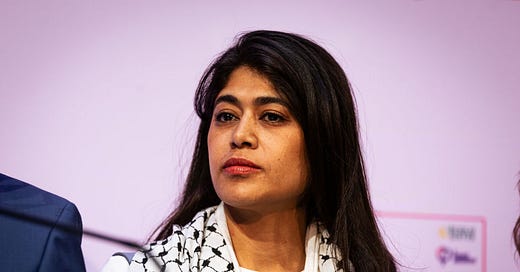



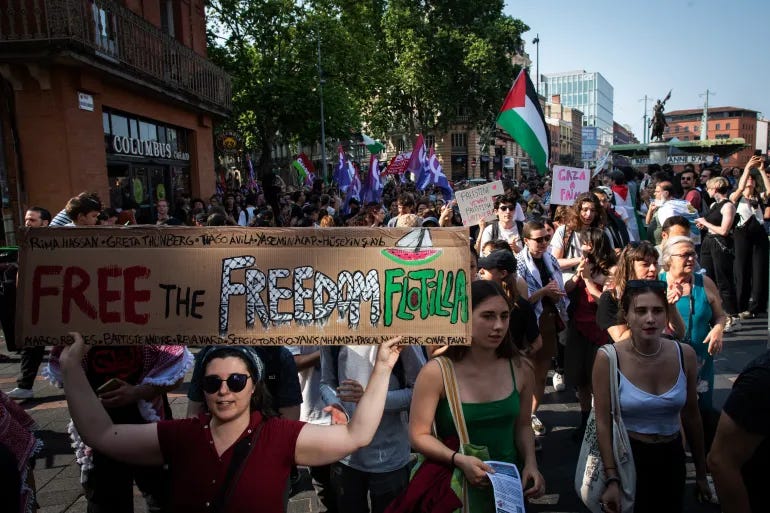
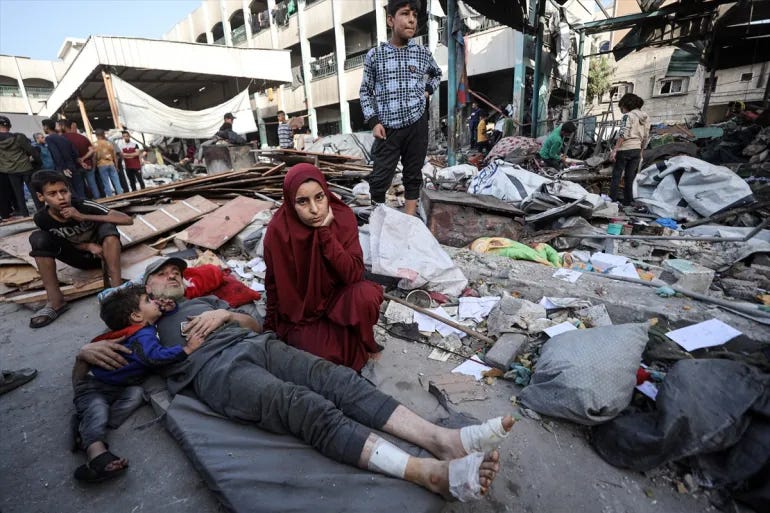
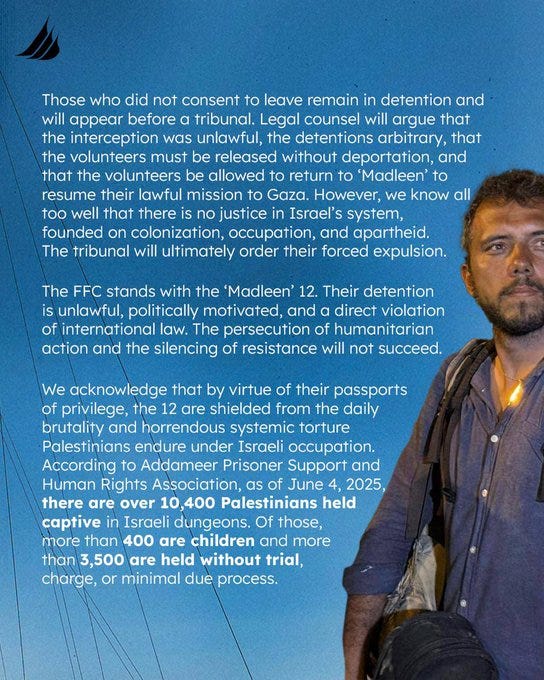
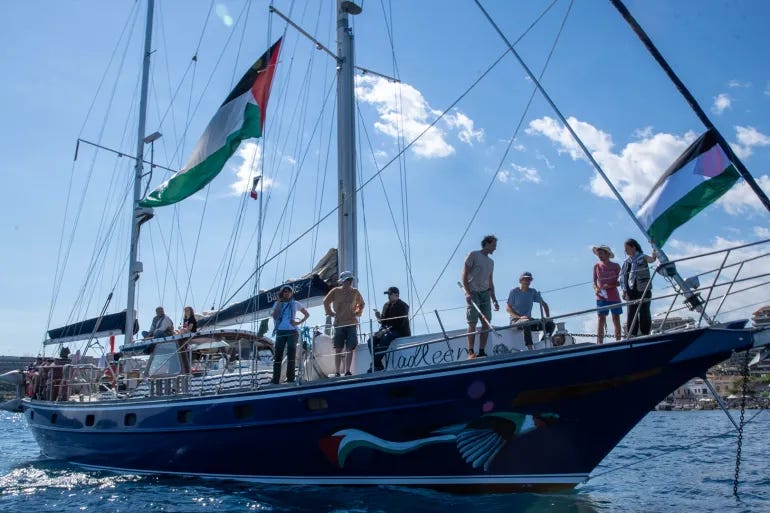
Thank you for an informative and insightful piece if journalism. I just spent a few minutes reading comments here and there, just to take the pulse of readers, and on many sites, (Matt Taibbi’s stands out), Greta Thunberg is being treated with so little respect that I fear for humanity. It’s incredible that this ad hominem slurring of a brave young woman is what passes for educated criticism among a group of people who have no excuse for their small minded bigotry.
No matter what you think of her, or her shipmates, they are victims of an international crime. How many ways are there to view this?
Tragedy beautifully written. Thank you.